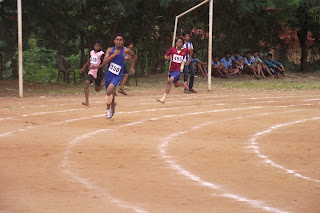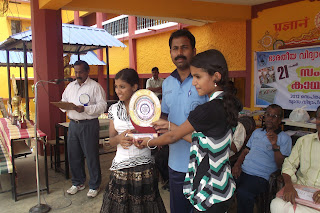SANSKRITI BODH PARIYOJANA
This project aims at enriching with cultural heritage, general knowledge and cultural background of the teacher and the taught. The exposure of the personality through vocal and written expression is very much essential for every body. This project works through the following four types of programmes :
All India Sanskriti Jnana Pariksha :
The examination has been in vogue since 1980. Separate question papers of one hour duration are set for classes 4 to 12. For guidelines and resource material to be made available to students, small booklets have been prepared for all these classes. Contents & depth of knowledge in of these booklets increases as the classes go up. Subject matter contains updated knowledge and information about Bharatiya culture, religion, History, festivals, Holy places, sacred rivers, mountains, national personalities sports & current events and achievements similar tests have been developed for the Teachers of Vidya Bharati affiliated Schools.These tests are conducted at three levels i.e. Prathma, madhyama & uttama. Those who are interested for detailed & deep study of Indian culture & heritage are given a higher level study & a test known as Pragya Pariksha is given for them. These tests are open is general public & parents of the students on line study & test facility is also being made available for those who may be interested. The examination is open to such students also who don't read in Vidya Bharati schools. Successful students are issued certificates.
Sanskriti Jnana Priksha for Teachers :
Sanskriti Jnana Priksha for teachers is also held every year. There are four stages viz. 'Prathama', 'Madhyama', 'Uttama'.Certificates are issued to successful teachers.The fourth study level is Pragya Priksha. It is for those who have successfully completed the earlier three stages.
Prashna Manch Programme (Quiz Competition) :
Prashna Manch Competitions are held on state, Regional and national levels in four stages viz. Primary, upper primary, Secondary and Senior Secondary. Subject matter to be tested through these quiz competitions is based on books on Sanskriti Jnana (Group wise) : some other books are prescribed from time to time on Culture, Astronomy, Freedom Movement and Biographies of our national heroes saints, scientists etc.
Essay Writing Competition :
This is also an all-India Programme. The Competition is held in four stages viz., Primary, upper primary, Secondry & Senior Secondary. Marking of the essays is done at state level and prizes for the best three essays of each group are given statewise. Topics of essays are based on 'Punya Bhoomi Bharat', Indian Culture, History, Prominent personalities in the field of science and literature, current social & environmental issues.
SCHOOL COMPLEX (SANKUL)
Kothari Education Commission has recommended to start complexes viz. with in a radius of 8 to 15 KMs. wherein one Senior Secondary School/Secondary school will work as nexus and all primary/Upper primary schools falling in the area will be attached to it. This group of schools will serve as a viable resource centre & with available potential and guidance, educational development would be easily possible. The system will break the terrible isolation under which each school functions. Vidya Bharati has not only accepted this proposal but strengthened it more by bringing the community of the complex into its fold. The whole network of schools in states has been reorganized through Sunkulas (Complexes). More accountability falls on sunkula Kendra to provide strength and guidance in the unit members of the Sunkul than on units. The system is sure to show better results.
OLD STUDENTS COUNCIL
(Poorva Chhatra Parishad)
Before the inception of Vidya Bharati a large number of students having received education from our schools held prestigious positions in their life. In order to maintain effective rapport with them, student councils have been established at school and state level. These councils serve as fixed- Deposits. Old students not only render financial help to their Alma Mater but also take up many projects of educational excellence and social work in the school & community. lacs of old students are rendering effective & active service to the society. Poorva Chhatra Parishad meets are held annually at school, state & Regional levels.
SHISHU VATIKA
(PRE-PRIMARY EDUCATION)
In India formal education of the child starts at 5+. In pre-independence days and some years of post-independence also, children normally remained with their parents in the joint families before joining school. In modern times, however, industrial and growing influence of western civilization has affected the family system especially of the cities. Montessary, Kindergarten or convent Nursery schools have sprung up in towns and cities. Little kids have been deprived of their tender childhood and heavy bags have broken their backs. Seeds of English way of life and conversation are sown at this very tender age. Vidya Bharati has started 'Shishu Vatika's' in large number to protect the initial stage of children from getting vitiated with the virus of western culture. There is a psychological endeavour to reduce the weight of the bag and encourage play-way methods of inculcating own Hindu ideology in the tiny-tots. Vidya Bharati 'Shishu Vatikas' reverberate with joyful sounds children as they undertake various activities which impart education and Sanskar in a natural way.
This project aims at enriching with cultural heritage, general knowledge and cultural background of the teacher and the taught. The exposure of the personality through vocal and written expression is very much essential for every body. This project works through the following four types of programmes :
All India Sanskriti Jnana Pariksha :
The examination has been in vogue since 1980. Separate question papers of one hour duration are set for classes 4 to 12. For guidelines and resource material to be made available to students, small booklets have been prepared for all these classes. Contents & depth of knowledge in of these booklets increases as the classes go up. Subject matter contains updated knowledge and information about Bharatiya culture, religion, History, festivals, Holy places, sacred rivers, mountains, national personalities sports & current events and achievements similar tests have been developed for the Teachers of Vidya Bharati affiliated Schools.These tests are conducted at three levels i.e. Prathma, madhyama & uttama. Those who are interested for detailed & deep study of Indian culture & heritage are given a higher level study & a test known as Pragya Pariksha is given for them. These tests are open is general public & parents of the students on line study & test facility is also being made available for those who may be interested. The examination is open to such students also who don't read in Vidya Bharati schools. Successful students are issued certificates.
Sanskriti Jnana Priksha for Teachers :
Sanskriti Jnana Priksha for teachers is also held every year. There are four stages viz. 'Prathama', 'Madhyama', 'Uttama'.Certificates are issued to successful teachers.The fourth study level is Pragya Priksha. It is for those who have successfully completed the earlier three stages.
Prashna Manch Programme (Quiz Competition) :
Prashna Manch Competitions are held on state, Regional and national levels in four stages viz. Primary, upper primary, Secondary and Senior Secondary. Subject matter to be tested through these quiz competitions is based on books on Sanskriti Jnana (Group wise) : some other books are prescribed from time to time on Culture, Astronomy, Freedom Movement and Biographies of our national heroes saints, scientists etc.
Essay Writing Competition :
This is also an all-India Programme. The Competition is held in four stages viz., Primary, upper primary, Secondry & Senior Secondary. Marking of the essays is done at state level and prizes for the best three essays of each group are given statewise. Topics of essays are based on 'Punya Bhoomi Bharat', Indian Culture, History, Prominent personalities in the field of science and literature, current social & environmental issues.
SCHOOL COMPLEX (SANKUL)
Kothari Education Commission has recommended to start complexes viz. with in a radius of 8 to 15 KMs. wherein one Senior Secondary School/Secondary school will work as nexus and all primary/Upper primary schools falling in the area will be attached to it. This group of schools will serve as a viable resource centre & with available potential and guidance, educational development would be easily possible. The system will break the terrible isolation under which each school functions. Vidya Bharati has not only accepted this proposal but strengthened it more by bringing the community of the complex into its fold. The whole network of schools in states has been reorganized through Sunkulas (Complexes). More accountability falls on sunkula Kendra to provide strength and guidance in the unit members of the Sunkul than on units. The system is sure to show better results.
OLD STUDENTS COUNCIL
(Poorva Chhatra Parishad)
Before the inception of Vidya Bharati a large number of students having received education from our schools held prestigious positions in their life. In order to maintain effective rapport with them, student councils have been established at school and state level. These councils serve as fixed- Deposits. Old students not only render financial help to their Alma Mater but also take up many projects of educational excellence and social work in the school & community. lacs of old students are rendering effective & active service to the society. Poorva Chhatra Parishad meets are held annually at school, state & Regional levels.
SHISHU VATIKA
(PRE-PRIMARY EDUCATION)
In India formal education of the child starts at 5+. In pre-independence days and some years of post-independence also, children normally remained with their parents in the joint families before joining school. In modern times, however, industrial and growing influence of western civilization has affected the family system especially of the cities. Montessary, Kindergarten or convent Nursery schools have sprung up in towns and cities. Little kids have been deprived of their tender childhood and heavy bags have broken their backs. Seeds of English way of life and conversation are sown at this very tender age. Vidya Bharati has started 'Shishu Vatika's' in large number to protect the initial stage of children from getting vitiated with the virus of western culture. There is a psychological endeavour to reduce the weight of the bag and encourage play-way methods of inculcating own Hindu ideology in the tiny-tots. Vidya Bharati 'Shishu Vatikas' reverberate with joyful sounds children as they undertake various activities which impart education and Sanskar in a natural way.
+copy.jpg)










